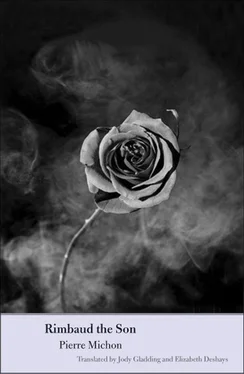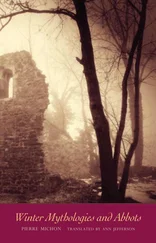Pierre Michon
Rimbaud the Son
There is a whole epoch between us and, today, an entire country of snow.
— Mallarmé
TRANSLATORS’ INTRODUCTION
Take it into your head to write a preface to Rimbaud, writes Pierre Michon, and your wings fall off; you start quoting the saints of the almanac. Duly warned, we proceed with caution and will be brief. Rimbaud le fils (Rimbaud the Son) was published in France in 1991, seven years after Michon’s first book, Vies minuscules (Small Lives). Vies minuscules won Michon immediate acclaim and was quickly followed by other successes; Rimbaud le fils was his fifth published work. Although still relatively unknown to readers in the United States, Michon is widely recognized in Europe as one of France’s foremost contemporary writers. He won the Grand Prix du Roman from the Académie Française for his most recent novel, Les Onze (The Eleven), and the Prix de la Ville de Paris for his entire opus.
In Rimbaud le fils , Michon asks what drives art. What explains a poet’s devotion to the word and then our own devotion to that poet after he abandons it? Through Rimbaud, Michon explores his recurring themes: the absent father, the smothering mother, the backwater upbringing, and how they shape that tortured mix of genius and ambition we call an artist. Although Michon begins with Vitalie Cuif, Rimbaud’s mother, it is really the paternal line, the father — or fathers — that interests him. Rimbaud le fils traces lineage as determined by literature and how Rimbaud becomes literature incarnate, only to reject that patrimony.
Michon is a virtuosic writer whose medium is language, yet his imagination is visual. Rimbaud is revealed to us in images. We see him first sitting for a school photograph. Later we follow him to Étienne Carjat’s studio for the shooting of that iconic portrait with the crooked tie. And finally there he is in Harar, posing before the banana fields, a figure no longer identifiable as “poetry in person.” These are all photographs but Michon’s methods are painterly. His eye for color, his sense of depth, dimension, composition, the way he returns again and again to the image, adding layer upon layer — all this renders Rimbaud le fils a meticulously painted canvas, or many canvases, from which the poet eternally escapes.
Dense and poetic, Michon’s work calls for every translation trick in the book. A Michon sentence is an architectural feat: shift the position of a verb, extract a semicolon, and the whole thing topples. But the delight of bringing Michon into English is multiplied by the daunting nature of the task. And by the sheer mastery of Michon’s prose: “What makes men write? Other men, their mothers, the stars, or the old enormous things, God, language? The powers know. The powers of the air are this breath of wind through the leaves. The night turns. The moon rises, there is no one against the haystack. Rimbaud, in the attic among some pages, has turned toward the wall and sleeps like lead.” What makes men write? Michon does not answer this question. But few writers have asked it so beautifully.
1. IT IS SAID THAT VITALIE RIMBAUD, NÉE CUIF
It is said that Vitalie Rimbaud, née Cuif, country girl and bad-natured woman, suffering and bad-natured, gave birth to Arthur Rimbaud. It is not known if she cursed first and suffered after, or if she cursed at having to suffer and persisted in that malediction; or if, joined like the fingers on her hand, curse and suffering overlapped in her mind, switched places, reinforced one another, so that, irritated by their touch, she crushed her life, her son, her living and her dead between her dark fingers. But it is known that the husband of this woman who was the father of this son, although alive, became a phantom in the purgatory of distant garrisons where he was only a name, when the son was six years old. There is some debate over whether that lightweight father, who was a captain, who read Arabic and dabbled in the annotation of grammar books, was justified in abandoning that creature of darkness who wanted to sweep him under her shadow, or if she only became that way because of the darkness into which his departure cast her; we just do not know. It is said that the child, with phantom on one side of his desk and creature of curse and disaster on the other, was the perfect schoolboy and had a strong attraction for the ancient game of verse: perhaps in the old perfunctory tempo of twelve feet he heard the phantom bugle of distant garrisons, and also the paternosters of the creature of disaster who, in order to recite her accursed suffering, had found God, just as her son, to the same end, discovered verse; and in that scansion he married the bugle and the paternosters, perfectly. Verse is an old matchmaker. So it seems that he composed it in great quantities from a very tender age, some in Latin, some in French; in these verses, which still exist, no miracle took place: they are from the hand of a gifted provincial child whose anger has not yet found its own consubstantial rhythm, that true rhythm thanks to which it is changed into charity without losing a fraction of its fine edge, anger and charity blended in the same movement released in a single burst and falling back with all their weight, or taking off but remaining there mixed, heavy, disabled, like fireworks that go off in your hand though sparking impeccably, all of which would later assume the name of Arthur Rimbaud. These were the exercises of a schoolboy. In the period when he was covering page after lined page with these practice scales, it is clear that the polite smile was not his forte and that he sulked, as shown in the photos that devout hands here and there have collected, multiplied like loaves, and that have passed unaltered through all the devout hands in the world: with, on his lap, the small round military cap of the Rossat Institute in Charleville, with that ridiculous scrap of clerical lingerie on his arm with which mothers used to deck out their sons for communion, here his small fingers slipped into the edge of a missal that appears cabbage green, there well hidden in the secret hollow of the kepi, but always the direct and wicked gaze, held out before him like a fist, as though greatly detesting or desiring the photographer who in those days covered himself with a black hood in order to fashion a future out of the past, to tamper with time, the child endlessly sulked. And the rest of his life, or our devotion, teaches us that beneath that appearance the true extent of his anger was considerable: not simply against the armband and the kepi but against the armband and the kepi as well. For under those old castoffs, it is said, there was the shade of the Captain and the living creature of refusal and disaster, of refusal in the name of God who castigated his soul in order that he become Rimbaud: not there in person, but their fabled effigies on either side of the desk; and though perhaps hating them both with all his might, and thus hating the verses in which paternosters and bugles married, he truly loved the mission that they required of him. That was why he was sulking. He persisted, and we know what followed.
Or perhaps he did not hate them at all: hate is not a good matchmaker. Verses are made to be given away, so that in exchange you are given something resembling love; they compose bridal wreaths; and as disastrous as she was, perhaps because she was so, the creature’s vocation more than anyone’s was to receive love, and why not give it: like everyone else, she aspired to impossible nuptials, whether knowingly or not. But since she had foundered in paternosters, had devoted herself to the dark, to the dark fingers inside her ripping her joy to shreds, since she had gotten herself up to her neck in the irremediable, the incommensurable, and finally since she, too, sulked, the usual childish gifts, the flowers and little smiles, the Hugoesque sentimentalities, which are, after all, part of reality as well and keep love circulating among creatures without disaster, all that was lost on her.
Читать дальше












